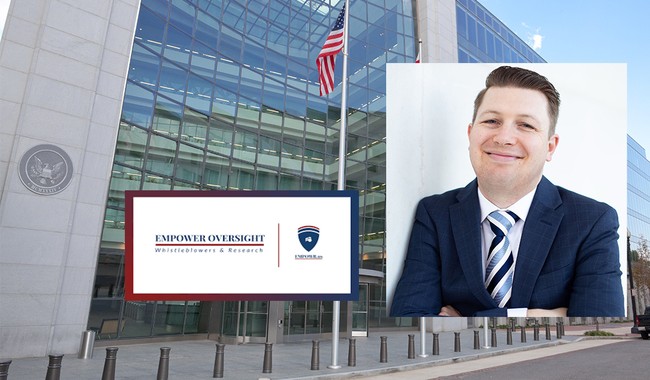
The president of Empower Oversight, the leading non-profit federal whistleblower law group, called upon Republican and Democratic congressional leaders with oversight of the Securities and Exchange Commission to release an inspector general report that details the conduct of then-SEC chairman Walter Joseph “Jay” Clayton III, and has the potential to validate Empower Oversight’s own investigation and records produced from Freedom of Information Act requests–before he is confirmed as President Donald J. Trump’s U.S. Attorney for the Southern District of New York.
Advertisement
“The records produced revealed conflicts of interest and possible self-dealing by officials involved in the SEC’s regulation of cryptocurrency,” wrote Tristan Leavitt in his 22-page Nov. 15, 2024, letter to the Republican and Democratic leadership of the House Financial Affairs Committee and the Senate Banking, Housing, and Urban Affairs Committee.
2024 10 25 Letter to Congre… by Neil
“In May 2022, Empower Oversight referred this evidence to the SEC Office of Inspector General, which opened an investigation,” he said. “The SEC OIG should be issuing its report to the SEC shortly if it has not already issued it.”
Leavitt said the matter requires public and congressional scrutiny if President Donald J. Trump is to be successful in making the United States the “Crypto Capital of the Planet,” he said.
Empower Oversight filed its first FOIA request with the SEC on Aug. 16, 2021, and the SEC failed to properly respond to FOIA requests, forcing Empower Oversight to file in December 2021 the first of several lawsuits against the SEC to force its compliance with FOIA, Leavitt said.
The current SEC inspector general is Deborah J. Jeffrey, who took her post April 17, 2023.
XRP v. Ether in the eyes of the SEC
At issue is how Clayton and SEC Division of Corporation Finance Director William H. Hinman, on Dec. 22, 2020, in the waning days of the first Trump administration, sued Ripple Labs along
with Christian Larsen, the company’s co-founder, executive chairman of its board, and former CEO, and Bradley Garlinghouse, the company’s current CEO, for selling $1.3 billion of its XRP crypto coin as unregistered securities.
Advertisement
The investigation was conducted by the SEC’s Cyber Unit, which charged the accused with violating the Securities Act of 1933.
Garlinghouse rebuked the SEC, claiming XRP was a cryptocurrency created in 2012 to facilitate cross-border transactions and which had functioned legally for eight years.
Supporters of XRP, many of whom refer to themselves as members of the XRP Army, responded by comparing how Clayton and Hinman treated the Ether cryptocurrency.
These so-called “digital sleuths,” joined by Empower Oversight, found that Hinman was receiving a severance from his old firm, Simpson Thacher, which was a member of the Enterprise Ethereum Alliance, created by the Ethereum Foundation — which are both dedicated to supporting the Ethereum exchange and its own Ether cryptocurrency.
Ether is a competitor cryptocurrency to XRP.
In addition to collecting compensation from his old firm, to which he returned after he left the SEC, Empower Oversight learned from its investigation, which included FOIA requests, that Hinman repeatedly met with Ethereum advocates and lawyers from his old firm during his tenure.
Hinman’s engagement with Ether and Ethereum supporters triggered the XRP Army because of the hall pass he and the SEC gave Ether and Ethereum, declaring them not securities and thus outside the commission’s purview.
The director of the Division of Corporation Finance, speaking at “Yahoo Finance All Markets Summit: Crypto” on June 14, 2018, in San Francisco, made that very case because, like Bitcoin, Ether was already too common and widely used. In effect, it was too late to regulate Ether.
Advertisement
And so, when I look at Bitcoin today, I do not see a central third party whose efforts are a key determining factor in the enterprise. The network on which Bitcoin functions is operational and appears to have been decentralized for some time, perhaps from inception. Applying the disclosure regime of the federal securities laws to the offer and resale of Bitcoin would seem to add little value, and putting aside the fundraising that accompanied the creation of Ether, based on my understanding of the present state of Ether, the Ethereum network and its decentralized structure, current offers and sales of Ether are not securities transactions. And, as with Bitcoin, applying the disclosure regime of the federal securities laws to current transactions in Ether would seem to add little value. Over time, there may be other sufficiently decentralized networks and systems where regulating the tokens or coins that function on them as securities may not be required.
And of course, there will continue to be systems that rely on central actors whose efforts are a key to the success of the enterprise. In those cases, application of the securities laws protects the investors who purchase the tokens or coins.
The rough translation of what Hinman said was that Ethereum is already out of the barn, so there is no point in having the SEC chase it.
As a practical matter, it was as if Clayton and Hinman proceeded with the concept that the SEC needed to regulate some crypto somewhere; it might as well be XRP.
Advertisement
The SEC charges against XRP were not a surprise.
In Leavitt’s letter to congressional leaders, he spells out how a former SEC commissioner, Joseph Grundfest, wrote to the SEC warning that action against XRP was unwarranted and problematic:
The staff has articulated no material distinction between the operation of Ether and of XRP that is relevant to the application of the federal securities laws. Imposing securities law obligations on XRP while leaving Ether untouched raises fundamental fairness questions about the exercise of Commission discretion Ether and XRP should be treated similarly.
Clayton resigned his chairmanship 12 hours after filing the charges against Ripple Labs, its leadership, and XRP.
Gensler’s SEC kept the pressure on XRP
After Clayton and Hinman left the SEC and returned to private practice, President Joseph R. Biden Jr.’s SEC chair Gary Gensler kept up the legal action against Ripple Labs and XRP, but in October 2023, dropped the charges against Larsen and Garlington.
🚨 $NEWS: RIPPLE CEO @BGARLINGHOUSE SAYS BIDEN’S APPROACH TO REGULATING CRYPTO, GENSLER’S ‘REIGN OF TERROR’ IS COMING TO AN END VERY SOON pic.twitter.com/UkXsF5RvKY
— blockchaindaily.news (@blckchaindaily) October 24, 2024
The legal proceedings against Ripple are still active, with both sides claiming victories along the way.
That could all change now that Gensler announced on November 21 that he was resigning from his position on January 20 — more than a year before his five-year term was set to expire in April 2026.
Advertisement
On January 20, 2025 I will be stepping down as @SECGov Chair.
A thread 🧵⬇️
— Gary Gensler (@GaryGensler) November 21, 2024
Trump announced that his own pick to replace Gensler is Paul Atkins, the founding CEO of Patomak Global Partners and the co-chairman of the Digital Chamber’s Token Alliance since 2017. Atkins also served as an SEC commissioner from 2002 to 2008.

